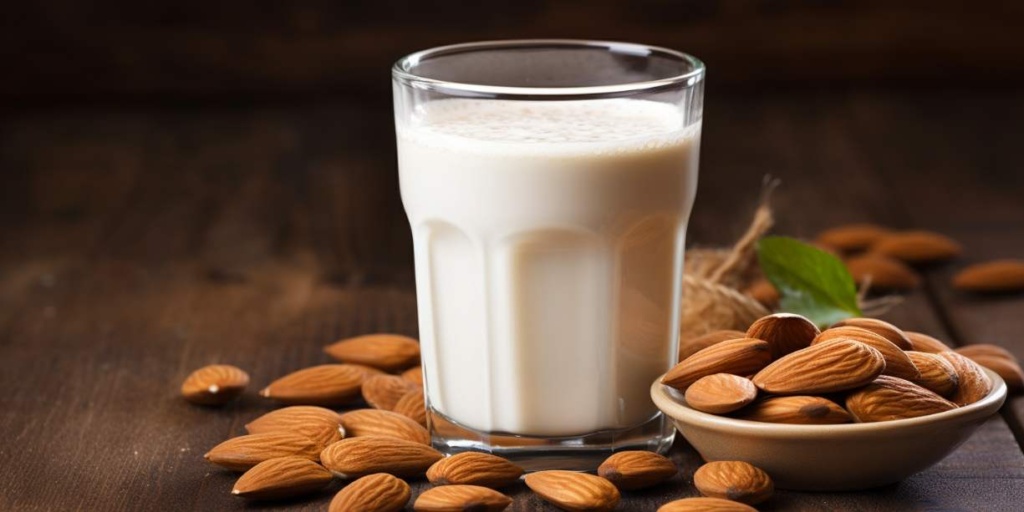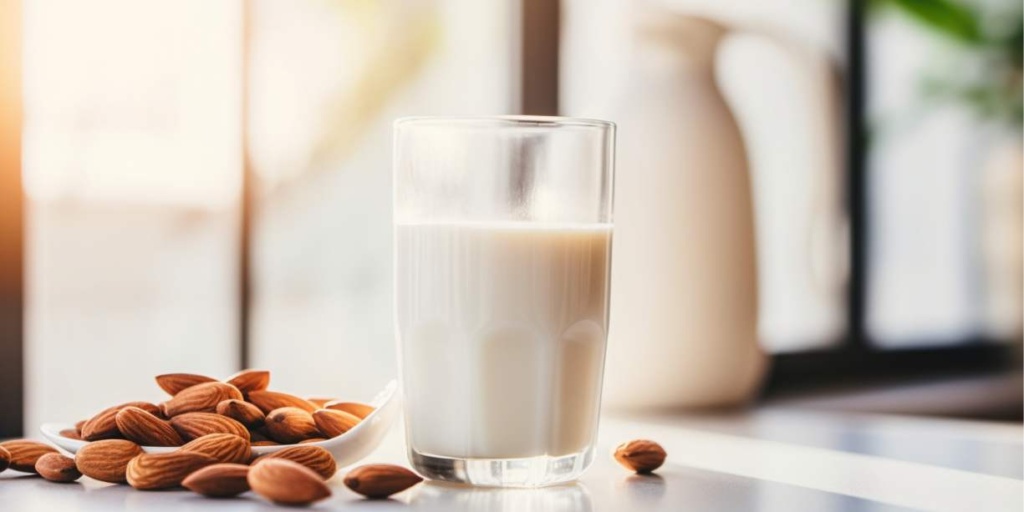Does Almond Milk Cause Acne? Unveiling the Truth
Almond milk has emerged as a popular dairy alternative, acclaimed for its nutritional value and smooth, nutty flavor. But amidst its rising fame, a puzzling question looms: Can almond milk cause acne? Let’s dissect this query to understand better:
- The Dairy-Acne Debate: The link between traditional dairy products and acne is a topic of ongoing debate in the scientific community. Some studies suggest that hormones, lactose, and certain proteins in dairy might exacerbate acne. As a non-dairy alternative, almond milk naturally sidesteps these potential triggers.
- Low Glycemic Index: Almond milk has a relatively low glycemic index compared to many other types of milk. This means it won’t cause a rapid spike in blood sugar levels, which some researchers believe can contribute to acne.
- But What About Additives?: Here’s where it gets complex. Not all almond milk is created equal. Some commercially prepared almond milks contain additives like sugar, stabilizers, and artificial flavors, which could potentially trigger acne in some people.
- A Personal Matter: Whether almond milk causes acne can also depend heavily on individual factors such as your genetic makeup, overall diet, stress levels, and skin care routine.
- Test and Observe: If you suspect almond milk might be contributing to your acne, consider removing it from your diet for several weeks to see if your skin improves. If you notice a difference, you may have found your culprit.
In a nutshell, almond milk, in its pure, unadulterated form, is unlikely to cause acne and might even be a beneficial swap for traditional dairy. However, potential additives and personal sensitivities can complicate the story. As with most things related to diet and skin health, it’s about understanding your body and finding what works best for you.

Introduction
You’ve probably wondered if your favorite almond milk could be causing your acne breakouts. Fact is, while some believe that almond milk, rich in omega-6 fatty acids, can trigger acne, there’s no scientific backing for this claim yet.
This blog will delve into the possible effects of almond milk on your skin and provide useful tips to manage acne-prone skin without missing out on its benefits. Excited? Let’s dive deeper into the relationship between your beloved non-dairy substitute and those pesky pimples!
Key Takeaways
- While there is no scientific evidence to link almond milk consumption to acne breakouts directly, it may potentially aggravate hormonal imbalance-related acne in some individuals due to its impact on hormone levels.
- Almond milk contains small amounts of omega – 6 fatty acids, which can trigger inflammation when consumed in excess. However, the present levels are typically insufficient to cause an acne breakout unless consumed excessively.
- Added sugars in almond milk can potentially contribute to skin inflammation and acne flare-ups. It’s important to choose unsweetened options or those with minimal added sugars for a healthier choice for your skin and overall well-being.
- Almond milk offers potential skincare benefits such as antioxidant properties from vitamin E and moisturizing effects from healthy fats. It also provides a lower sugar content compared to regular cow’s milk, reducing the risk of inflammation and breakouts. However, individual sensitivities and allergies should be considered before incorporating almond milk into your diet.
The Effect of Almond Milk on Acne
Almond milk’s impact on acne can vary from person to person due to its potential hormonal influence, omega-6 fatty acids content, and added sugars.
Comparison between regular milk and almond milk
Almond milk and regular milk are both popular beverage choices, but they vary markedly in their nutritional content and effects on the skin. Here’s a comparison:
| Regular Milk | Almond Milk | |
|---|---|---|
| Hormonal Impact | Some studies link dairy consumption to acne due to hormones present in the milk. | Almond milk can potentially aggravate hormonal imbalance-related acne, but its impact is usually less than dairy milk. |
| Omega-6 Fatty Acids | Regular milk doesn’t contain significant amounts of omega-6 fatty acids, which can trigger inflammatory acne. | Almond milk contains small amounts of omega-6 fatty acids, which could potentially influence acne in people consuming high amounts of these fatty acids. |
| Sugars | Regular milk contains lactose, a natural sugar, which might contribute to inflammation and acne in sensitive individuals. | Often, almond milk has added sugars, which can contribute to blood sugar spikes and skin inflammation if consumed in excess. |
| Allergenic Potential | Dairy is a common allergen and can cause inflammation and acne in sensitive individuals. | Almonds are also a potential allergen, but almond milk is generally well-tolerated unless one has a specific nut allergy. |
| Nutritional Benefits | Regular milk is a good source of protein, vitamins, and minerals, but its potential skin impacts can outweigh its nutritional benefits for some people. | Almond milk is often fortified with vitamins and minerals, making it a healthy choice for those looking to avoid dairy. However, it’s lower in protein than regular milk. |
This comparison shows that both almond and regular milk have pros and cons concerning acne. Personal tolerances and dietary factors will significantly determine which option is best for each individual.
Potential hormonal impact of almond milk
The hormonal influence of almond milk on acne is a matter of interest for many individuals, and it’s largely tied to an individual’s specific sensitivities. Consuming excessive amounts of almond milk may potentially aggravate conditions related to hormonal imbalance, including acne.
Almond milk stimulates the production of hormones such as insulin growth factor-1 (IGF-1) that might result in skin breakouts.
Ingestion of particular food items can lead to an inflammatory response in some people based on their unique body chemistry and dietary reactions. Even though no scientific proof directly links almond milk with acne, some studies correlate high IGF-1 levels induced by certain foods with increased sebum production, which could promote pore clogging and potential flare-ups.
While advantageous for those lactose intolerant or allergic to dairy, the impact of Almond Milk on Acne-prone skin or Hormonal Imbalance-related acne cannot be overlooked depending upon one’s personal dietary triggers.
Omega-6 fatty acids in almond milk
Omega-6 fatty acids, found in small quantities in almond milk, have been the subject of debate within the acne discussion. These fats are essential for overall health but consuming them in large amounts can spark inflammation – a primary contributor to acne.
Inflammatory acne is often linked with high omega-6 diets since these fatty acids promote skin inflammation when out of balance with omega-3s. While almond milk contains some omega-6, it’s important to note that the levels present are typically insufficient to bring on an acne breakout unless consumed excessively.

Added sugars in almond milk
Almond milk, like many other beverages, can sometimes contain added sugars. These added sugars are not ideal for acne-prone skin as they can potentially contribute to breakouts. Consuming excessive amounts of sugar has been linked to increased inflammation in the body, which may exacerbate acne symptoms.
While almond milk doesn’t naturally contain high levels of sugar, it’s important to check the label and choose brands offering unsweetened options or those with minimal added sugars.
Opting for unsweetened almond milk can be healthier for your skin and overall well-being.
The Benefits of Almond Milk for Acne
Almond milk offers potential benefits for acne-prone skin, providing a nutritious alternative to regular milk. From its possible skincare advantages to the nutritional value it provides, discover how almond milk can contribute positively to your overall skin health.
Potential skin benefits
Almond milk offers potential skin benefits, making it a favorable choice for those looking to improve their complexion. Firstly, almond milk is often enriched with vitamins and minerals like vitamin E, which is known for its antioxidant properties.
These antioxidants can help protect the skin against damage from harmful free radicals and promote a youthful appearance.
Additionally, almond milk contains healthy fats that can moisturize the skin from within. The natural oils in almonds are nourishing and can contribute to maintaining proper hydration levels in the skin, resulting in a smoother and more supple complexion.
Another benefit of almond milk is its lower sugar content compared to regular cow’s milk. Excess sugar consumption has been linked to increased inflammation in the body, which can manifest as acne breakouts on the skin.
By choosing almond milk as an alternative, individuals may reduce their overall sugar intake and potentially minimise acne flare-ups.
Nutritional advantages
Almond milk offers several nutritional advantages that may be beneficial for those struggling with acne. First, almond milk is low in sugar compared to regular cow’s milk, which is important as high sugar intake has been linked to increased inflammation and breakouts.
Secondly, almond milk is a good source of vitamin E, an antioxidant that helps protect the skin from damage caused by free radicals. Additionally, almond milk contains healthy fats, such as monounsaturated fats, which can help keep the skin moisturized and supple.
Lastly, almond milk is often fortified with vitamins and minerals like calcium and vitamin D, which are essential for overall skin health. While no scientific evidence links almond milk directly to acne prevention or treatment, its nutritional profile suggests it could be a favorable alternative for individuals looking to improve their skin condition through dietary choices.

Potential Downsides of Almond Milk for Acne
Almond milk may not be suitable for everyone with acne-prone skin. Factors such as individual sensitivities and hormonal responses can vary, potentially leading to breakouts. Find out more about the potential downsides of almond milk for acne [link].
Allergic reactions or sensitivities
Almond milk may not be suitable for everyone, especially those with allergies or sensitivities to almonds. While rare, some individuals may experience allergic reactions when consuming almond milk, such as hives, swelling, or difficulty breathing.
Awareness of any existing nut allergies is crucial before incorporating almond milk into your diet.
Apart from allergies, some people may also have sensitivities to almonds that can manifest in various ways, including digestive issues like bloating or discomfort. If you suspect an almond sensitivity, it’s best to consult a healthcare professional who can provide guidance and alternatives.
Individual variations in hormonal response
Individuals have unique hormonal profiles, which can significantly affect how their bodies react to certain foods. When it comes to almond milk and acne, these individual variations in hormonal response can be a factor to consider.
Some people may find that their acne is aggravated by consuming almond milk due to its potential impact on hormone levels. Almond milk contains small amounts of omega-6 fatty acids, which can influence inflammation and potentially worsen inflammatory acne in some individuals.
It’s important to note that not everyone will experience this effect, as each person’s body responds differently. While there is no scientific evidence linking almond milk consumption to acne breakouts, some individuals may find that reducing or eliminating dairy products, including almond milk, helps improve their skin condition.
Dairy-free alternatives to consider
If you’re looking for dairy-free alternatives to almond milk, plenty of options are available. These alternatives can provide similar nutrients without the potential risk of triggering acne. Consider adding the following dairy-free milk options to your diet:
- Oat Milk: Oat milk is made from a blend of oats and water, offering a creamy texture and a slightly sweet taste. It is naturally low in fat and contains beta-glucan, which can help soothe inflammation in the body.
- Coconut Milk: Coconut milk is made from the flesh of coconuts and offers a rich and creamy texture. It is high in healthy fats, which can help nourish the skin and support overall skin health.
- Soy Milk: Soy milk is derived from soybeans and provides a good source of protein, calcium, and vitamin D. However, it’s important to note that soy products may trigger acne for some individuals, so it’s best to try it out and see how your skin responds.
- Cashew Milk: Cashew milk is made from blending cashews with water, creating a creamy and nutty flavor profile. It contains healthy fats that can improve skin elasticity and hydration.
Overall diet and lifestyle factors
Maintaining a healthy diet and lifestyle is crucial for managing acne-prone skin. Here are some key factors to consider:
- Balanced Nutrient Intake: Ensure you get a well-rounded diet with essential vitamins and minerals. Vitamin A, vitamin E, zinc, and selenium are known to support skin health.
- Hydration: Drink plenty of water to keep your skin hydrated and help flush out toxins from your body.
- Limit Processed Foods: Highly processed foods, such as sugary snacks, refined grains, and fast food, can contribute to inflammation in the body and potentially worsen acne symptoms.
- Fiber-Rich Foods: Include plenty of fruits, vegetables, whole grains, and legumes in your diet. These fiber-rich foods can promote healthy digestion and may help reduce acne breakouts.
- Avoid Trigger Foods: Certain foods may trigger acne flare-ups in some individuals. Common culprits include dairy products, high-glycemic index foods (like white bread or sugary beverages), chocolate, and greasy/fried foods. Pay attention to how your skin reacts when consuming these items.
- Stress Management: Chronic stress can disrupt hormone balance and contribute to acne breakouts. Engage in stress-reducing activities like exercise, meditation, or hobbies to promote overall well-being.
- Skincare Routine: Establishing an effective skincare routine can help manage acne-prone skin. Use gentle cleansers formulated for acne-prone skin and avoid harsh scrubbing or using too many products that may irritate the skin further.
- Sleep Quality: Aim for quality sleep of 7-9 hours per night as insufficient sleep can affect hormones linked to acne formation.

Consulting with a healthcare professional or dermatologist
Consulting with a healthcare professional or dermatologist is essential for individuals dealing with acne-prone skin. These experts can provide personalized advice and guidance based on the specific needs of each individual.
They can help identify any underlying causes or triggers of acne, such as hormonal imbalances, and recommend appropriate treatments or lifestyle changes. A healthcare professional or dermatologist can also offer valuable insights on the potential impact of almond milk consumption on acne breakouts, taking into consideration factors like omega-6 fatty acids and estrogen content.
Seeking professional advice ensures that you receive accurate information tailored to your unique circumstances, helping you make informed decisions about your skincare routine and overall diet.
Tips, Hacks, Techniques and More
When it comes to managing acne, understanding your body’s intolerance to certain foods is crucial. Almond milk is one such food that might cause acne in some individuals, especially when compared to dairy milk.
Almond milk, being a plant-based alternative, is low in calories and high in phytoestrogens, which are plant compounds found in almonds. These compounds might influence hormonal balance in the body, potentially leading to acne in some individuals.
However, almond milk is also rich in unsaturated fat and has a high antioxidant content, which can help reduce inflammation in the skin cells. It’s also a source of omega-3 fatty acids, which are known for their anti-inflammatory properties.
Eating a diet high in these nutrients, along with plenty of other plant-based foods, can provide plenty of skin-friendly benefits. According to the American Heart Association, a diet rich in unsaturated fats can be beneficial for heart health.
However, it’s important to note that regular consumption of almond milk instead of dairy milk might not be suitable for everyone. For instance, those with a dairy allergy or lactose intolerance might find almond milk to be a suitable alternative.
On the other hand, almond milk vs dairy milk might not make a significant difference for those without these conditions. As always, it’s best to consult with a certified dermatologist or dietitian to understand what’s best for your individual needs.
Remember, acne can damage your confidence, but it’s important to know that there are many potential causes of acne, and diet is just one of them. So, don’t let acne discourage you from eating foods you enjoy.
In conclusion, while almond milk might cause acne in some individuals, it’s also packed with plenty of skin-friendly nutrients. So, whether you choose almond milk instead of dairy milk or opt for plenty of other plant-based alternatives, remember to listen to your body and make dietary choices that support your overall health.
Conclusion
In conclusion, while almond milk has been associated with potential triggers for acne such as omega-6 fatty acids and hormonal imbalances, there is currently no scientific evidence to suggest that it directly causes acne breakouts.
Individual sensitivities and dietary factors play a significant role in determining the impact of almond milk on acne-prone skin. As with any dietary change, it’s important to listen to your body and consider dairy-free alternatives if almond milk may aggravate your skin.
FAQs
Can almond milk cause acne?
A: There are mixed opinions on whether almond milk can cause acne. Some people claim that it can aggravate acne or cause breakouts, while others believe it doesn’t affect skin.
Is almond milk bad for acne?
A: It’s not certain whether almond milk is bad for acne or not, as there is no clear evidence to support either claim. However, some people may experience acne breakouts or aggravation after consuming almond milk.
What are some plant-based milk alternatives?
A: Some plant-based milk alternatives include soy milk, rice milk, oat milk, and coconut milk. These milk alternatives are often used as a substitute for dairy milk which can cause acne in some people.
Can almond milk cause skin problems?
A: For some people, almond milk can cause skin problems such as acne; this may be due to almond milk’s high omega-6 fatty acid content and its possible effect on the body’s androgen (male hormone) levels.
Should I avoid almond milk for healthy skin?
A: If you experience acne or skin problems after consuming almond milk, you may need to avoid it. However, if almond milk doesn’t affect your skin, you can still include it in your diet as it is high in vitamin E, calcium, and antioxidants that can promote healthy skin.
Is almond milk high in omega-6 fatty acids?
A: Yes, almond milk is high in omega-6 fatty acids which can be a cause of inflammation in the body. However, the omega-6 content of almond milk is lower than that of raw almonds because the process of making almond milk removes some of the oil and fat.
What is the connection between almond milk and hormonal acne?
A: Some people claim that almond milk can aggravate hormonal acne due to its high phytoestrogen content. However, there is no clear evidence to support this claim. If you are experiencing hormonal acne, it’s best to consult a dietitian to determine the correct dietary approach.
Is almond milk linked with acne?
A: There is no clear link between almond milk and acne, but some may find it contributes to breakouts. It’s important to listen to your body and avoid any foods that negatively affect your skin.
How does almond milk compare to cow milk?
A: Almond milk is a plant-based milk alternative, while cow milk is an animal-based product. dairy milk is much higher in protein and some vitamins and minerals than almond milk, while almond milk is lower in calories and fat.
Can switching to almond milk help me achieve clear skin?
A: While almond milk is high in vitamin E and antioxidants that can promote healthy skin, it is not certain if switching to almond milk can lead to clearer skin. However, reducing your intake of dairy milk, which can cause acne in some people, may help improve your skin condition.
Helpful Resources
https://theacnedietitian.com/does-almond-milk-cause-acne/
https://www.byrdie.com/which-foods-cause-breakouts-4688626
https://glowandgreens.com/does-almond-milk-cause-acne/
https://fourseasonslasercenter.com/almond-milk-cause-of-acne/
https://mycozyroom.com.sg/milk-and-acne-does-milk-causes-acne-breakouts/
https://realdetroitweekly.com/does-almond-milk-cause-acne/
